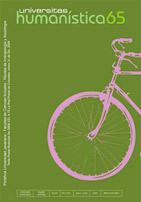Abstract
Initiating from a crucial concept of recognition (German: Anerkennung) formulated 200 years ago by Hegel, the author explores the complexity of the concept of subject, initiated by the references of Freud and Heidegger; structuralism; poststructuralisms; and new, more complex perspectives such as the one presented by Peter Sloterdijk. Based on an intense exploration of the topic (psychoanalysis, journals, references from various points of view), the author ties the reflection on the subject with the figure of Telemaco as an archetype of the promise of reconciling the village with the world, patriarchal with matriarchal myths beyond the empires, and the personal and collective efforts in pursuit of “homing” as a room with a sense of justice in the world house.
This journal provides immediate open access to its content on the principle that making research freely available to the public, encourages greater global exchange of knowledge.
The journal Universitas Humanística is registered under a Creative Commons Attribution 4.0 International Public License. Thus, this work may be reproduced, distributed, and publicly shared in digital format, as long as the names of the authors and Pontificia Universidad Javeriana are acknowledged. Others are allowed to quote, adapt, transform, auto-archive, republish, and create based on this material, for any purpose (even commercial ones), provided the authorship is duly acknowledged, a link to the original work is provided, and it is specified if changes have been made. Pontificia Universidad Javeriana does not hold the rights of published works and the authors are solely responsible for the contents of their works; they keep the moral, intellectual, privacy, and publicity rights.
Approving the intervention of the work (review, copy-editing, translation, layout) and the following outreach, are granted through an use license and not through an assignment of rights. This means the journal and Pontificia Universidad Javeriana cannot be held responsible for any ethical malpractice by the authors. As a consequence of the protection granted by the use license, the journal is not required to publish recantations or modify information already published, unless the errata stems from the editorial management process. Publishing contents in this journal does not generate royalties for contributors.


